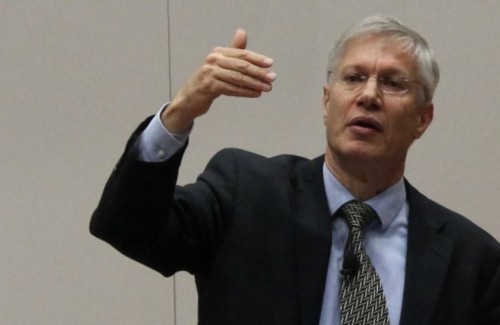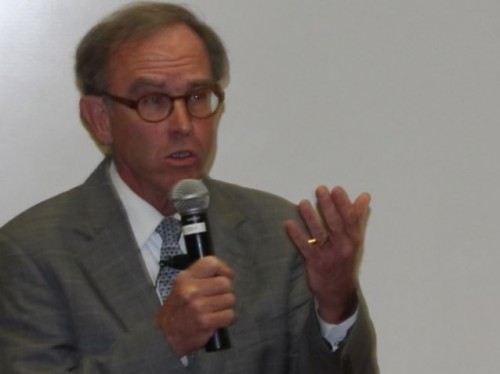
Is Obamacare “the cure for America’s crashing health care system, or is it more of the poison killing the patient?”
The answer to that question was sought Wednesday in a packed auditorium at the University of Arizona during a debate sponsored by the Ayn Rand Institute, the UA Objectivists, UA College Republicans, and the UA chapter of Young American’s for Freedom.
The opposing factions were Obamacare advocate Dr. Keith Joiner, professor and former dean of UA’s College of Medicine, and individual liberty proponent Dr. Yaron Brook, executive director of the Ayn Rand Institute.
“I’m sure some of you are saying to yourself: wait, we have the best healthcare in the world,” Joiner said in his opening statement. “The simple fact is that we don’t.”
Joiner went on to cite infant mortality and life expectancy rates in the U.S. as compared to other developed nations as the reason why he feels the U.S. healthcare system falls short.
But Brook said America does have the best health care in the world if you eliminate lifestyle factors.
“If you have heart disease and cancer this is the country you want to be in – nowhere else,” Brook said. “You do not want to be treated in any other health care system than the United States.”
However, that system is in danger, according to Brook.
“Generally, we don’t have insurance anymore, we have a massive system of redistribution of wealth from the young and healthy to sick and old,” Brook said.
When asked about the winners and losers created under the new healthcare law, Brook offered: “Almost everybody is a loser.”
“Insurance companies are winners in the short term,” he said. “But in the long term there will be no insurance companies in the U.S. because Obamacare is just a stepping stone towards universal healthcare and towards the complete socialization of medicine.”
In Joiner’s opinion, there could potentially be losers resulting from Obamacare if more cost-control measures are instituted.
“Everybody loses when there are cost controls,” Joiner said. “Doctors lose. The insurance companies lose. Medical device manufacturers lose. Pharmaceutical companies lose. And the consumers lose if it means that you have to bear more of the cost.”
However, Joiner sees clear winners stemming from the legislation for “those who are uninsured or underinsured.”
The next question probed into the debaters’ philosophical opinions over whether or not Americans should have to choose to purchase healthcare, something that is compulsory under the new law.
“I would say yes they should have that option, if they also take accountability for the cost associated with any illness they acquire,” said Joiner.
Brook had a similar perspective.
“I don’t think society has obligations to its people,” Brook said, citing a main tenet of Objectivism. “Society is not responsible for you; you are responsible for yourself. Society shouldn’t dictate whether you have insurance or not.”
Brook concurred with Joiner’s sentiments, stating that “now, as a consequence, you should bear the cost if you get sick and don’t have insurance.”
As for Obamacare’s chances of success or a failure, that depends on who’s asked.
“To me, measures of success or failure, at the end of the day, is measured of freedom, of individual liberty,” Brook said. “I’ve already declared it a failure by that standard.”
Joiner did not provide a straight answer to the question, and instead discussed the extension of coverage to those with preexisting conditions.
Joiner in turn asked for further explication over Brook’s assertion that there is a correlation between insurance regulation and higher costs.
“Regulation always raises the cost of doing business because it constrains competition,” Brook responded. “It allows the insurance companies to control the markets.”
In closing arguments, the debaters returned to their fundamental beliefs.
“I just want to come back to this issue of insurance and the problem that one gets into with insurance if you don’t price it appropriately to redistribution,” Joiner said. “And that is a well known concept known as adverse selection.”
Adverse selection refers to the raising of insurance premiums, the limiting of coverage, or the discrimination certain consumers.
Joiner asserted that this phenomenon leads to a “death spiral,” in which those who are young and healthy drop out of the insurance pool thus raising the costs for those who are sick an in need. According to Joiner, this will be prevented under the new law.
Brook concluded by noting that “the rule of government is to eliminate coercion from human life.”
“It’s to allow us to be free,” he said. “It’s to allow us to pursue our happiness. It’s to allow us to pursue our lives, to make choices that we see fit.”
And by forcing healthcare on Americas, according to Brook, government is overstepping its purpose.
While both sides presented compelling arguments, no clear winner emerged by the end of the debate, according to audience members.
Kevin Moynahan, a senior studying physiology at UA, said the debate was a “close call.”
“They both made really good points, but I think I came into this debate more on Dr. Joiner’s side, and so as a result I tend to sort of go with his ideology,” he said. “I think that Dr. Brook made some good points that helped me understand his side better, but ultimately I’m still with Dr. Joiner.”
Neil Hillis, a UA senior studying ecology, said: “I think that if anyone could have said to be won it would be Dr. Brook because he seemed to be more charismatic as a speaker.”
No clear answer to whether Obamacare is the cure or disease to our healthcare system could be determined, according to Hillis.
“The debate was so broad that nobody could really be moved by specific evidence,” he said.
College Fix contributor Julianne Stanford is a student at the University of Arizona.
Click HERE to Like The College Fix on Facebook / Follow us on Twitter – click HERE
IMAGES: Main – Mark Brannan
INSIDE: Julianne Stanford (top – Dr. Brook; bottom, Dr. Joiner)






Please join the conversation about our stories on Facebook, Twitter, Instagram, Reddit, MeWe, Rumble, Gab, Minds and Gettr.